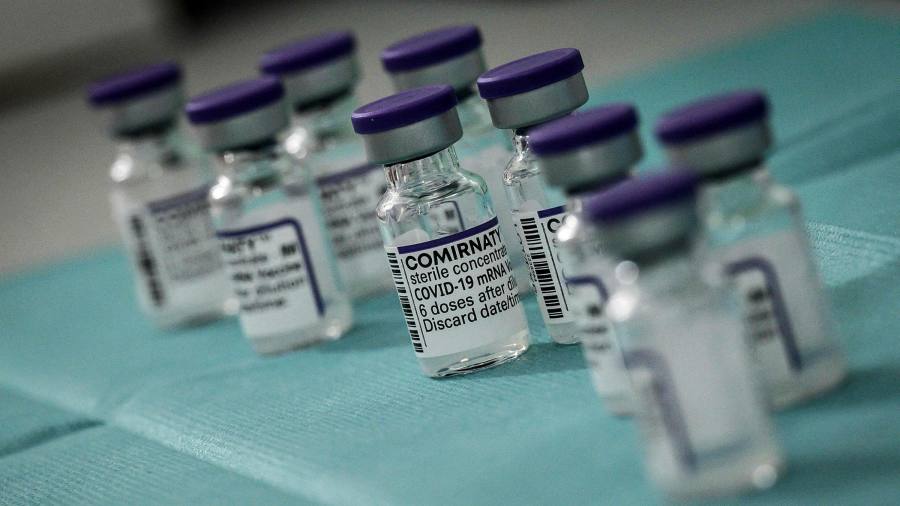The BioNTech/Pfizer vaccine may be less effective against Omicron than other strains of coronavirus while still offering a degree of protection, according to a South African study that offers an early if incomplete analysis of how the jab will handle the new variant.
Researchers from the African Health Research Institute reported the loss of immune protection from the vaccine was “extensive but incomplete” in the first published study that pitted the jab against Omicron.
The researchers took 14 plasma samples from 12 participants that had been vaccinated with two doses of the BioNTech vaccine and tested the ability of the plasma to neutralise Omicron.
The laboratory experiments found Omicron infection resulted in a 41-fold reduction in virus-blocking antibodies compared with the original strain of the virus detected in Wuhan almost two years ago.
Omicron also escaped antibody neutralisation “much more extensive[ly]” than the Beta variant that was previously dominant in South Africa, the study’s authors found.
However, Alex Sigal, head of research at the Durban-based laboratory, said that despite the significant reduction in antibody production, Omicron did not evade the vaccine entirely.
In a much more positive finding, the researchers reported that people who had previously been infected with Covid-19 in addition to having been double-vaccinated retained “relatively high levels” of antibody protection. That would “likely confer protection from severe disease in Omicron infection”, they added.
The preliminary results follow the rapid spread of the Omicron variant since it was first identified in South Africa in late November, raising concerns among health experts that it could evade existing vaccines.
Ugur Sahin, chief executive of BioNTech, responded to the publication of the South African study by saying the company expected to publish its own data later this week. “I would be more optimistic,” he told NBC.
Eric Topol, founder and director of the Scripps Research Translational Institute, said the results suggested vaccine makers would probably have to develop a new class of Omicron-specific boosters.
“It looks like what we’d expect, going along with the many vaccine breakthrough cases that have already been reported with Omicron,” he added.
Danny Altmann, professor of immunology at Imperial College London, said the South African study raised hopes that “boosted people would typically be safe”.
The study showed that doubled-jabbed people who had also previously been infected were “all in the safe zone”, according to Altmann, who said this group was in some ways comparable with people who had received three doses.
Jacob Glanville, a computational immunologist and founder of US therapeutics company Centivax, said the study suggested most double-vaccinated people would be susceptible to infection from Omicron.
“The reason [public health officials] are asking people to boost is because . . . [double-vaccinated] people will have a little bit of antibody protection but most won’t have enough to usefully neutralise the virus,” he added.
Still, Glanville added that T-cells, which target a wider portion of the virus than antibodies, would allow double-vaccinated people to “retain protection against severe disease”.
Morgan Stanley said the African Research Institute’s data suggested a significant drop in vaccine effectiveness below 50 per cent against symptomatic disease with Omicron.
“While we await further data from Moderna and Pfizer, we believe the likelihood of a variant specific booster is increased,” said Matthew Harrison, an analyst at Morgan Stanley.
Last week, Stéphane Bancel, Moderna’s chief executive, warned that the new variant would likely result in a “material drop” in vaccine effectiveness.
Separately, researchers at Sweden’s Karolinska Institutet said they had observed “exceptionally variable” loss of neutralisation against Omicron, with some samples “showing almost no loss” and some showing considerably more.
The average loss of potency of neutralisation was “lower than feared”, which would make Omicron worse than Delta but “not as extreme as we expected”, said Ben Murrell, one of the investigators. The researchers used a pseudovirus engineered to look like the new strain in their experiments.
They said that what was common between the South African and Swedish studies was that “neutralisation is not completely lost for all samples, which is positive”.
Neutralisation assays cannot predict perfectly whether a vaccine will be effective. Earlier on Tuesday, Kate O’Brien, the head of vaccines at the World Health Organization, said: “We know already that antibody performance against variants is one piece of information” but that more complete studies on effectiveness would not be complete for some time.
Additional reporting by Peter Wells in New York
